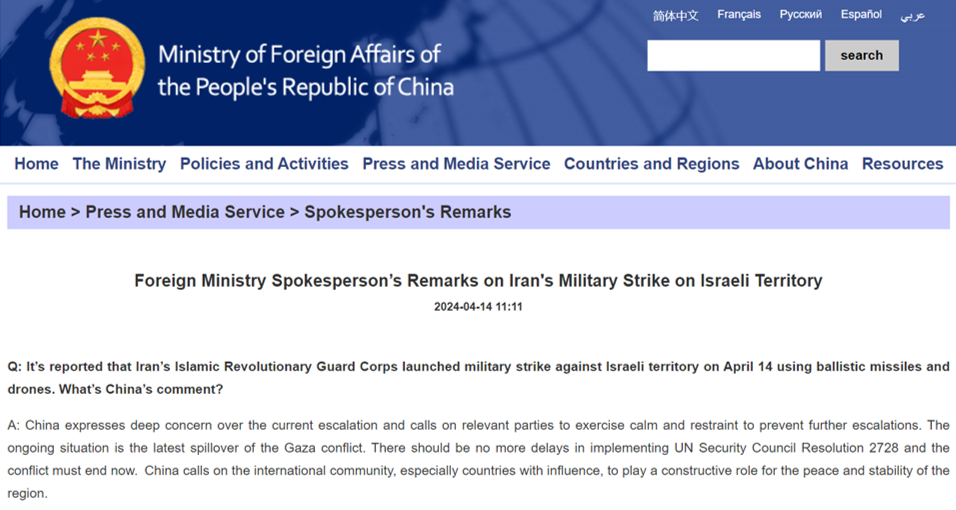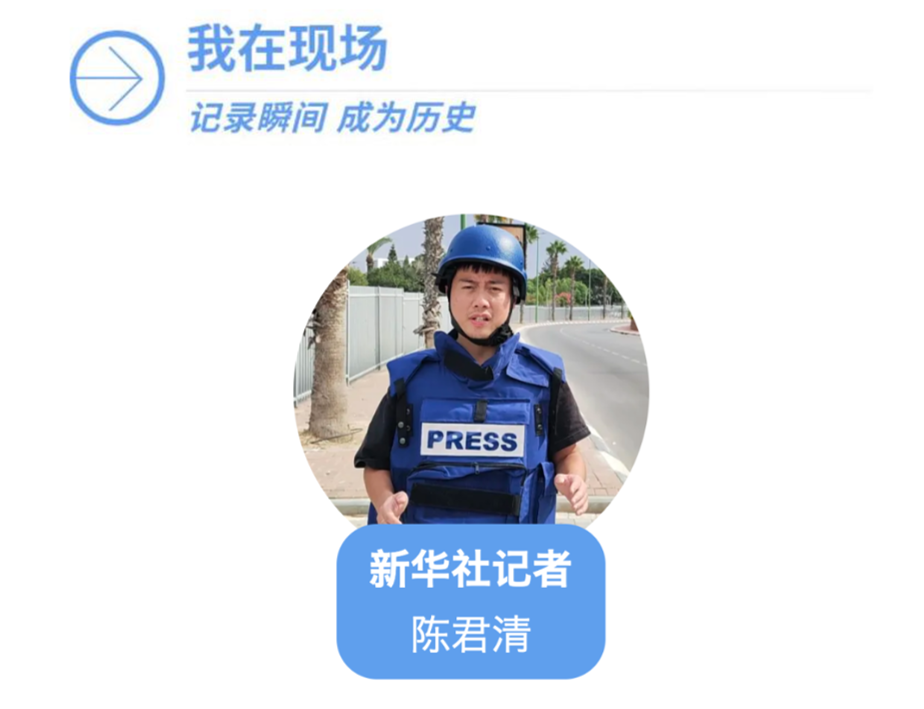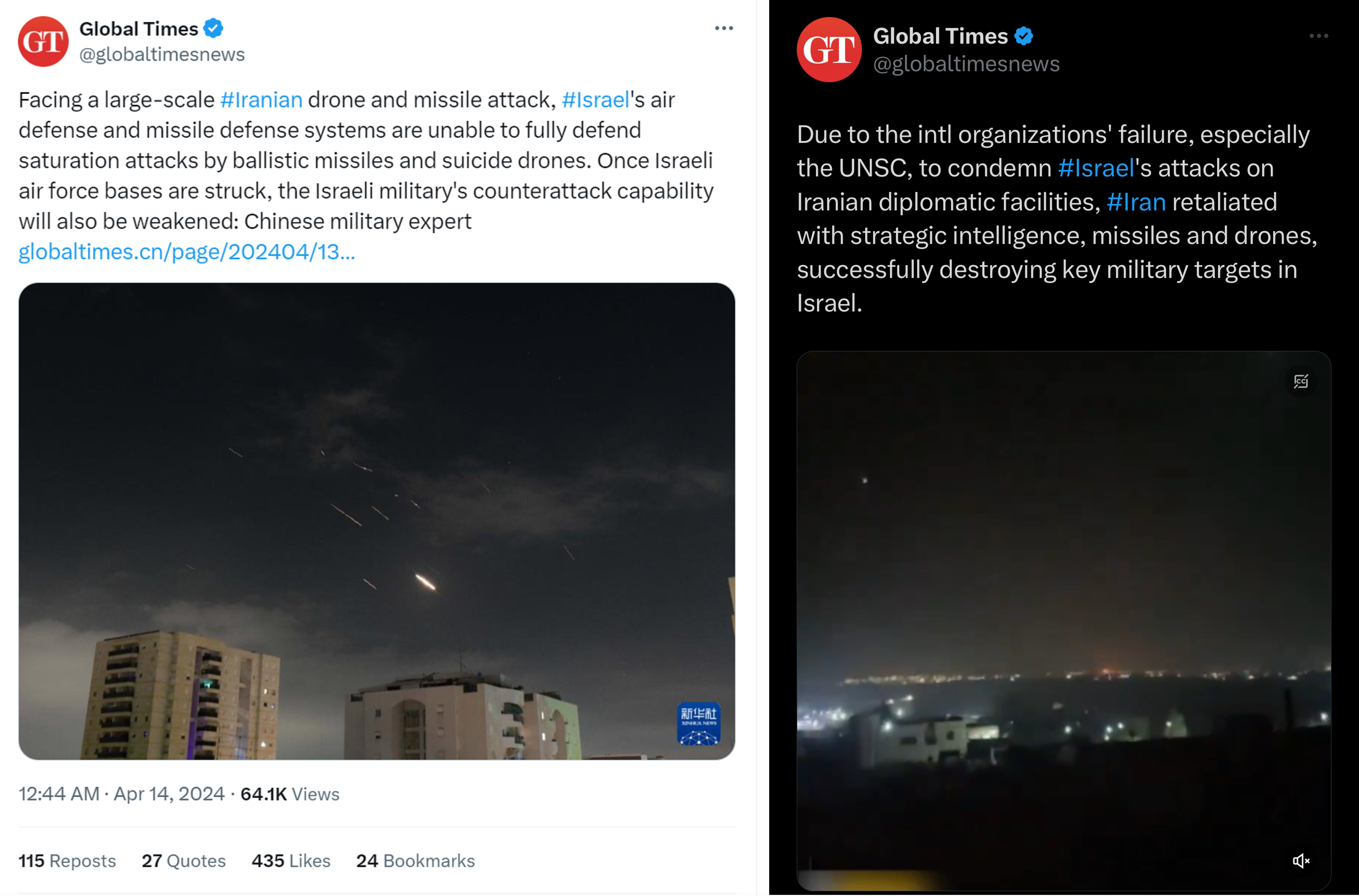Iran conducted a drone and missile attack against Israel on April 13th in response to an Israeli airstrike against a building next to the Iranian Embassy in Syria on April 1st. Israel conducted the airstrike against the embassy, targeting the meeting of senior Iranian Revolutionary Guard Corps (IRGC) officers at a building near the embassy due to their role in the ongoing conflict between Israel and Hamas and Hezbollah. The airstrike resulted in the deaths of several senior Iranian Revolutionary Guard Corps officers, including Brigadier General Mohammad Reza Zahedi. While several countries made statements condemning the attack, China’s response to the Iran’s attack was consistent with its previous responses to the ongoing Gaza conflict.
Ministry of Foreign Affairs
China’s Ministry of Foreign Affairs (MFA) spokesperson released a brief statement regarding the attack on April 14th. The statement was a response to the question: “According to reports, on April 14th, Iran’s Islamic Revolutionary Guard Corps launched a military strike on Israeli territory using ballistic missiles and drones. What is China’s comment?” The MFA spokesperson’s answer was that “China is deeply concerned about the current escalation of the situation and calls on relevant parties to remain calm and exercise restraint to avoid further escalation of tensions.” The ministry also pointed out that “this round of escalation” is the latest manifestation of the spillover of the conflict in Gaza. The top priority is to effectively implement the U.N. Security Council Resolution 2728 and stop the Gaza conflict as soon as possible. China “calls on the international community, especially influential countries, to play a constructive role in maintaining regional peace and stability.”

On April 15th, the Chinese Foreign Affairs Minister (FAM) Wang Yi called his Iranian counterpart, Iranian FAM Hossein Amir-Abdollahian, at his request. The Iranian FAM presented Iran’s position on the attack on its embassy in Syria, stating that the UNRC “did not make the necessary response and Iran had the right to respond in self-defense to the violation of its sovereignty.” However, Abdollahian also pointed out that the region’s current situation is very sensitive, and Iran is willing to exercise restraint and has no intention of further escalating the situation. Iran advocates an immediate ceasefire in Gaza and supports China’s “active efforts” to promote a ceasefire, restore regional peace, and strengthen cooperation among regional countries.” The minister said the country is willing to work with China to promote increased cooperation between Iran and China.
The FAM said, “China strongly condemns and firmly opposes the attack on the Iranian embassy in Syria, and believes that this incident seriously violates international law and is unacceptable.” He also said the country acknowledged Iran’s statement that the actions it took were limited and that it was “an exercise of the right of self-defense in response to the attack on its embassy building.” China appreciates Iran’s emphasis on not targeting regional countries and neighboring countries and its reaffirmation of its continued pursuit of good-neighborly and friendly policies. Wang said that “Iran can grasp the situation well and avoid further instability while safeguarding Iran’s sovereignty and dignity.”
However, the minister also pointed out that the current situation is the result of “the spillover effect” of the escalation of the Gaza conflict. The top priority is to implement UNSR 2728 as soon as possible, achieve a ceasefire and end the war in Gaza, effectively protect civilians, and prevent further exacerbation of humanitarian disasters. Wang then said that China is “willing to maintain communication with Iran and jointly promote a comprehensive, fair and lasting solution to the Palestinian issue since China and Iran are comprehensive strategic partners.” China is willing to work with Iran to steadily advance practical cooperation in various fields and promote greater development of China-Iran relations.
State Media

Another aspect of China’s was how it used its state-owned media, in the form of articles and social media posts, to respond to the attack. Both Xinhua and the Global Times published articles that presented details about the attack and Chinese analysts’ thoughts about the attack. For example, the various Xinhua articles discussed topics such as China’s reaction to the attack in the U.N. and reporter Chen Junqing’s, albeit sanitized, experiences when he was in the cities of Tel Aviv and Jerusalem both before and during the attack. However, Xinhua also published an article on April 14th that ‘analyzed’ the reasons why the United States would not help Israel retaliate against Iran. The article provided two reasons for the United States not wanting to assist Israel in launching a retaliatory attack against Iran: the United States did not want to be dragged into a war with Iran, and the Biden Administration considered the political implications an attack would have on the upcoming 2024 elections.

However, Global Times also published two articles and at least two social media posts about the April 13th attack, but used them to push China’s narrative about the conflict and the United States commitment to its allies. The April 14th article pointed out the MFA statement China published and Israel’s and Iran’s responses to the attack. The article also discussed how Israel’s air and missile defense system would likely “face significant pressure” due to Iran using ballistic and cruise missiles along with suicide drones to swarm the system. The article specifically cited Wei Dongxu, an “editor of a military program on Global News Radio,” extensively in the article concerning how Iran’s attack would weaken Israel’s ability to launch retaliatory attacks.
Wei said that Israel would not be able to “fully defend [against] saturation attacks by ballistic missiles and suicide drones. Once Israeli air force bases are struck, the Israeli military’s counterattack capability will also be weakened.” Furthermore, the article also cited two anonymous analysts who discussed why the United States would intervene on behalf of Israel. They said that Israel hopes to achieve its goal of “pulling the U.S. into the mire [a potential regional war]” and to regain the Biden administration’s support.
The news outlet also published an article on April 15th that discussed a sanitized view of how various countries responded to Iran’s attack. The article cited both the U.N. Secretary General and China’s charge d’affaires of China’s U.N. Permanent Mission responses to the attack, as well as the analysis from various anonymous “Chinese experts.” The article also discussed the meeting between the Special Envoy of the Chinese Government on Middle East Issues, Zhai Jun, and Israeli Ambassador Irit Ben-Abba Vitale. Zhai reiterated China’s positions that an “immediate ceasefire in the Gaza Strip; ensure humanitarian assistance; release all detained individuals as soon as possible; and achieve a political solution to the Palestinian issue based on the ‘two-state solution;’ allowing Israel and Palestine to peacefully coexist.”
The report cited Professor Liu Zhongmin and Director Zhu Weilie from the Institute of Shanghai International Studies University’s Middle East Institute in the article. Liu discussed the possibility of Israel responding to the April 13th attack and the potential for the country’s response to escalate into a regional war. Zhu discussed how Iran and the United States responded to the attack, indicating that Israel “failed “to escalate tensions” between the countries to draw the United States “tight to the Middle East.”
Analysis
China’s response illustrates how the country will continue to use the ongoing conflict to increase its influence in the region while also balancing against showing too much support for Iran. Furthermore, the country also used its response to push its narratives regarding alliances with the United States and missile defense system capabilities. The April 14th MFA statement is the most notable example of China’s balancing strategy since it did not condemn the attack but only expressed its deep concern about the current escalation of the situation. China’s rationale behind using this language is to enable it to give some support to Iran while not showing solidarity with other countries that supported Israel by condemning the attack.
However, connecting the April 13th attack to the ongoing conflict in Gaza indicates how China will use these events to push for the implementation of a ceasefire. Furthermore, the comment about influential countries playing a constructive role in maintaining regional peace is a reference to the United States and other countries that assisted Israel in intercepting the drones and missiles. China views the countries’ assistance as only increasing instability in the region since Israel will only be emboldened to retaliate against Iran.
Wang’s phone call with his Iranian counterpart on April 15th also illustrates how China is continuing to implement this strategy. The best example is his comments about China’s condemnation of the April 1st attack and acknowledging Iran’s right to self-defense in its response while stopping short of mentioning the April 13th attack. Another aspect of his comments is how he pointed out that Iran understands the situation and will avoid further instability while the country safeguards its dignity and sovereignty. China wanted to highlight this since the country wants to push Iran’s narrative that the attack is a legitimate response to Israel’s attack that violated international law.
Wang’s comments about how the current escalation is the spillover from the Gaza conflict further reinforce China’s attempts to use these events to push for a ceasefire. However, his comments are more pointed than the April 14th MFA statement since it listed out China’s goals for ending the conflict. The rationale behind Wang listing out the ways China wants to see the conflict end is to show that the country is for the Palestinians, which would allow the country to increase its influence in the region. His comments, however, are aimed at providing as much support to Iran as possible without risking derailing or upsetting China’s attempts at repairing relations with either the United States or the European Union.
The various Xinhua and Global Times articles about the April 13th attack allowed China to push its narratives regarding the U.S.-alliance system and missile defense systems. The Xinhua article analyzed the two reasons why the United States would not assist Israel in retaliating against Iran: the United States’ desire not to get involved in a regional conflict and considerations for the 2024 presidential elections. However, the Xinhua article highlighted various sentences that allowed it to push its narrative that the United States will not help its allies. For example, the article highlighted the comment that “the United States does not support and will not participate in Israel” to specifically show that the country will not support one of its major allies. Furthermore, the comments, “Israel should notify the United States in advance if it wanted to retaliate” and “will not seek conflict with Iran,” are an attempt to show that the United States will limit or constrain its allies’ ability to conduct operations.
The Global Times articles and social media posts were more forward regarding the narratives that China pushed to its audiences. The April 14th article discussed how Israel’s missile defense system would face significant issues in defending against Iran’s drones and missiles. China used Wei’s comments to show countries, such as Taiwan, would be unable to defend their military facilities and other important sites from and effectively respond to similar attacks. Furthermore, this narrative is also aimed at Taiwan since China knows the island’s recent emphasis on increasing its air and missile defense capabilities to better defend against any drone and missile attacks China will use during any blockade or invasion. Wei’s pointing out that Iran’s attack would specifically destroy or heavily damage airbases, which is also aimed at Taiwan since its military has also increased its abilities to repair its airbases in the event of a missile attack from China.
However, both the April 14th and the April 15th articles also pointed out that Israel is attempting to drag the United States into a regional conflict by intervening on its behalf. The anonymous analysts said that Israel wants the United States to intervene to pull the country into a potential war and to increase support from the Biden administration. The April 15th article echoed this view by citing Zhu’s comments regarding how Israel failed in its plan to increase tensions between Iran and the United States to keep the country’s attention turned to the Middle East. The rationale behind the comments from both the anonymous analysts and Zhu is to highlight that alliances do not work since they have the potential to drag countries into disputes or conflicts. The comments specifically make the case against alliances with the United States by highlighting that the country will not help Israel because it does not want to enter a regional war or because the Biden administration wants to harm its chances of winning the 2024 elections.


